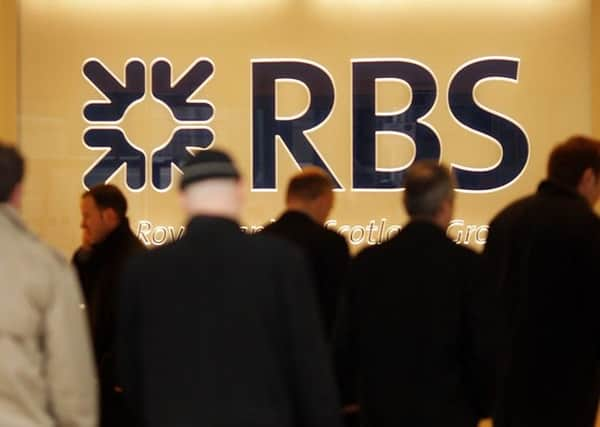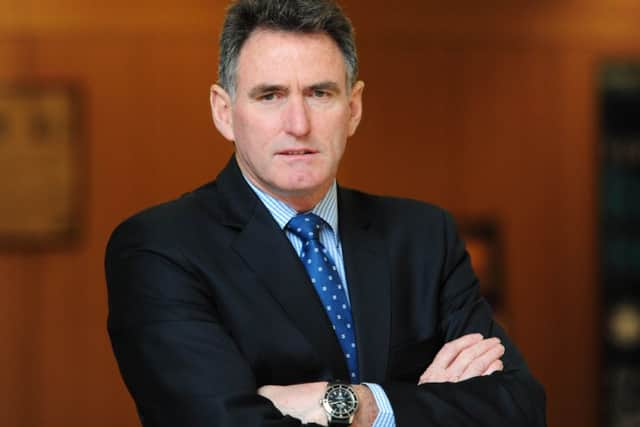Fears for thousands of jobs as RBS downsizes


RBS chief executive Ross McEwan will flesh out details of the downsizing when he presents the results of a review on Thursday. The sharp about-turn comes as the mostly taxpayer-owned bank is expected to post group losses of more than £7 billion for 2013 – an increase on the £6bn loss the previous year.
Reports have suggested the bank will shed up to 30,000 more jobs through the latest retrenchment – one in four of the workforce – but Mr McEwan has told staff there will be no major employment announcement this week.
Advertisement
Hide AdAdvertisement
Hide AdIn an internal memo to RBS’s 120,000 staff yesterday, the boss said he realised the speculation about major change was “frustrating and unsettling”.


He said: “As I’ve said to many of you, we get this kind of attention because of the bank we are. This isn’t just any bank. We’re subject to more scrutiny and discussion than others because of our unique ties to the UK people.”
RBS is 81 per cent owned by the UK taxpayer after a £45bn state bailout in the global financial crisis that followed its disastrous acquisition of Dutch banking giant ABN Amro in 2007.
In the memo, Mr McEwan said: “I’m not going to fuel the speculation by commenting on everything that’s been written – but I do want to say that there will be no big announcement on jobs next week.
“The focus of next week will be explaining our ambition to become a great bank for customers, and detailing the plan we need to deliver it … until then, please support each other to ensure we stay focused on our customers and their needs.”
However, banking union Unite yesterday demanded “clarity over future staffing levels at RBS”. The union’s national officer, Rob MacGregor, said RBS, which has made 30,000 job cuts in recent years, should not treat staff like “disposable pawns”.
Mr McEwan’s downsizing of RBS will meet with the approval of Chancellor George Osborne, who has stressed his desire for the bank to become far more UK-centric much faster than previous chief executive Stephen Hester was prepared to accept.
Mr McEwan is set to say that RBS will further shrink its investment banking arm, as well as further downsize the global empire built up by Fred Goodwin.
Advertisement
Hide AdAdvertisement
Hide AdIt is understood RBS is in talks with national regulators about withdrawing from up to half of the 38 countries in which it operates. This would mirror the strategy of the other part-taxpayer owned bank, Lloyds, under its chief executive, Antonio Horta-Osorio.
As part of a shake-out of billions of pounds of “non-core” assets by Mr Hester, RBS has already shed retail and commercial banking operations in markets such as Taiwan, Hong Kong, Singapore, Indonesia, Argentina, Chile and the United Arab Emirates.
However, it still does business in countries such as Australia, China, Italy, Romania and South Africa.
Ian Gordon, banking analyst at broker Investec, said: “There’s still unfinished business in terms of RBS getting out of a lot of its overseas markets.”
The bank is also said to be ready to take costs out of its central functions such as finance, risk and accounting, and is looking at the future of its US and Asian investment banking businesses.
Mr McEwan has previously said there are major “cost efficiencies” that could be made at RBS and that he aims to get the group’s key cost-income ratio down from the current 68 per cent to a figure in the mid-50s.
But it is unclear whether he plans to give a firm figure for cost savings at this week’s presentation.
“To get to the sort of cost-income ratio Ross says he wants, I would be looking for cost efficiencies of about £2bn over the next three years,” Mr Gordon said.
Advertisement
Hide AdAdvertisement
Hide AdThe cuts would include already announced plans to sell RBS’s American retail business, Citizens, which employs 18,500, and a UK retail business, Williams & Glyn, which has more than 300 branches and employs 4,500.
Mr McEwan is likely to tread delicately on the issue of branch closures, analysts say.
One commented: “My guess is he will copy Antony Jenkins at Barclays and, without putting any firm figure on branch closures, indicate the direction of travel, refusing to rule them out when so many are doing banking online or on the phone.”
Goodbye global player, hello domestic bank – but when will taxpayers get their money, writes Bill Jamieson
What a woeful spectacle the RBS chest-beating global giant of old now presents. Chief executive Ross McEwan may shield the reality of retreat with talk of “strategic withdrawal”. But it is a retreat, and one that makes Napoleon’s trek from Moscow look like the briskest of sprints.
Many of the job losses are already known. But what is set to stand out in next week’s restructuring statement is a severe amputation of its investment banking division. Once considered the beating heart of RBS that pumped and gushed the wherewithal for expansion across so many fronts, its days are numbered. McEwan has screwed up the courage to make heavy cuts to the bank’s 11,000 investment bank staff as it retreats from US and Asian markets.
This marks a major victory for Chancellor George Osborne and Treasury officials who tried in vain to press McEwan’s predecessor Stephen Hester to plunge the knife into this high-earning but high-risk division.
Overall, there is no disguising the dramatic scale of the shrinkage of RBS: it could represent a quarter of its 120,000-strong workforce – this on top of 40,000 jobs already gone.
Advertisement
Hide AdAdvertisement
Hide AdAnd with investment banking folded in as an adjunct to corporate banking activities, RBS will be a dramatically reduced consumer-facing retail bank mainly serving household and business customers.
Many will hail the McEwan strategy as long overdue. But major questions lie ahead. How can investor confidence be rebuilt given the huge overhang of legacy provisions, fines, penalties and bad debts?
After all this, will RBS have the revenue to maintain heavy investment in online digital banking and present a compelling proposition for future investors?
And, once reduced to a look-alike Lloyds Banking Group, what exactly can it offer to the public that is better than, or different to, its competitors? It is not more look-alike banks we need but a range of banks differentiated by specialist competence and activity.
Ross McEwan has taken bold steps and in the right direction. But a return of taxpayer funds from this crippled 81 per cent-owned institution and a sale of shares to the public looks well beyond 2015.